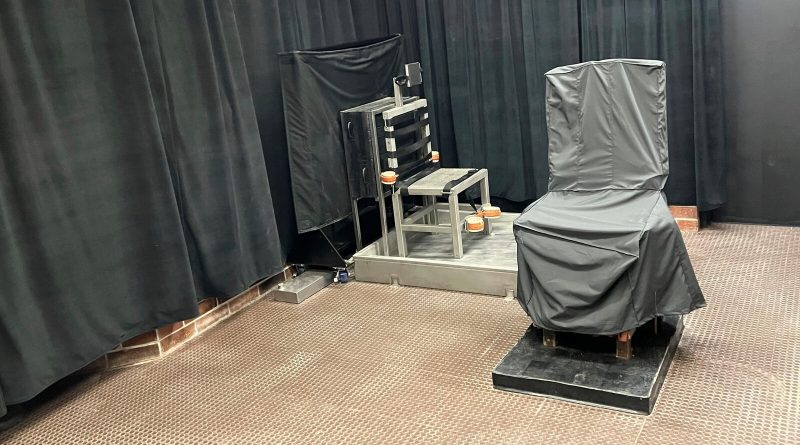South Carolina’s Supreme Court Upholds Legality of State Death Penalty, Including Firing Squad
COLUMBIA, S.C. — South Carolina has the authority to carry out capital punishment on death row inmates through a firing squad, lethal injection, or the electric chair, as determined by the state’s supreme court ruling on Wednesday, paving the way for the resumption of executions after an absence of more than ten years.
Every one of the five justices concurred with at least a portion of the decision. However, two of the justices expressed reservations about the legality of utilizing a firing squad as a method of execution, with one of them asserting that the electric chair constitutes a form of punishment that is both cruel and unusual.
In the United States, 27 states authorize the death penalty, but only seven have carried out executions in the past three years due to legal challenges surrounding excessive suffering, appropriate procedures, and the legality of novel methods like nitrogen gas suffocation or firing squads, which have seldom been used outside of military settings.
“We must first acknowledge the harsh reality that there is no graceful manner in which to terminate a man’s life,” wrote Justice John Few in the majority opinion.
South Carolina’s decision to provide inmates with a choice among the three modes of execution is not an attempt to inflict pain, but rather a genuine effort to humanize the death penalty, according to Few.
Up to eight inmates may have exhausted their traditional appeals. It remains uncertain when executions might resume, or if there will be any further legal challenges.
“We are currently assessing the next steps in the legal process and are dedicated to defending our clients’ rights,” stated Lindsey Vann, a lawyer for Justice 360, an organization advocating for the rights of inmates.
South Carolina is authorized to proceed with any of the three methods once the state Supreme Court issues an execution directive, according to Bryan Stirling, Director of the Corrections Department.
“The choice cannot be deemed as inhumane because the condemned prisoner has the option to select the method that he and his legal counsel believe will result in the least amount of suffering,” Few explained.
Since the reinstatement of the death penalty in the United States in 1976, South Carolina has executed 43 inmates. The majority of inmates have chosen lethal injection since it became an option in 1995.
South Carolina has not conducted an execution since 2011, as the state’s supply of lethal injection drugs had expired, and pharmaceutical companies refused to sell more if their identities were made public. Justices stated that the state could utilize a single drug instead of three following the passage of a shield law in 2023, enabling officials to keep the suppliers of lethal injection drugs confidential and procure the sedative pentobarbital in September.
In 2021, lawmakers approved the establishment of a firing squad in South Carolina, offering inmates a choice between that and the electric chair that the state acquired in 1912. In response, inmates filed a lawsuit, arguing that both options represented cruel and unusual punishment, which is prohibited by the Constitution.
Four of the five justices concurred that none of the three methods violate the state constitution in terms of cruelty. Justice John Kittredge voiced his belief that the firing squad should be deemed illegal due to its rarity — even though it has been an option since South Carolina’s inception, it has never been utilized.
Chief Justice Don Beatty argued that both the electric chair and firing squad are forms of cruelty. He stated that a firing squad would result in a gory scene and there would be no guarantee that the three executioners would precisely target the heart. Additionally, the electric chair is now seldom used because of its painful and disfiguring nature, with prisoners experiencing severe burns and bleeding prior to death, according to Beatty.
Beatty drew a comparison between the electric chair and burning someone at the stake.
“The only distinction, in my opinion, is the ‘modernization’ in the previous century of the ignition process — from a match to electric current. The ultimate outcome of the procedure, for all intents and purposes, remains the same,” Beatty wrote.
The justices stipulated that the prison director must still furnish evidence that the lethal injection drug remains stable and properly mixed. Inmates retain the right to challenge this determination, with the court vowing to reach a swift decision.
Currently, South Carolina has 32 inmates on death row. Four convicts are engaged in legal action, while four others have exhausted their appeals, although two of them are awaiting a competency hearing before their potential execution, according to Justice 360.
Governor Henry McMaster applauded the justices for their interpretation of the law. “This ruling represents another step toward ensuring that lawful sentences are carried out and that the families and loved ones of victims finally receive the closure and justice they have long sought,” he declared in a statement.
During arguments before the state Supreme Court in February, South Carolina argued that lethal injection, electrocution, and firing squad all align with existing death penalty procedures. “Courts have never mandated that death must be immediate or painless,” asserted Grayson Lambert, an attorney for the governor’s office.
South Carolina previously carried out an average of three executions annually and had over 60 inmates on death row when the last execution occurred in 2011. Since then, successful appeals and natural deaths have decreased the number to 32.
In the past 13 years, prosecutors have only added three new individuals to death row. Faced with increasing expenses, a shortage of lethal injection drugs, and more aggressive defenses, they are opting to accept guilty pleas and life imprisonment without parole, even in cases where a convicted murderer was initially sent to death row by a jury.

